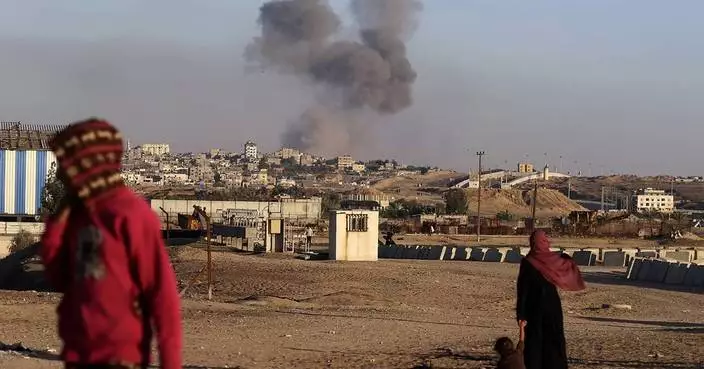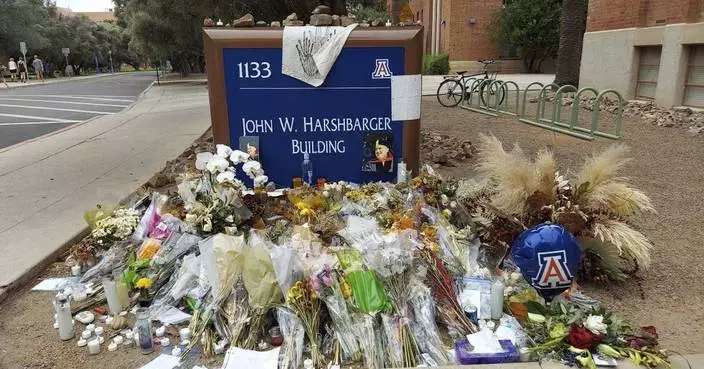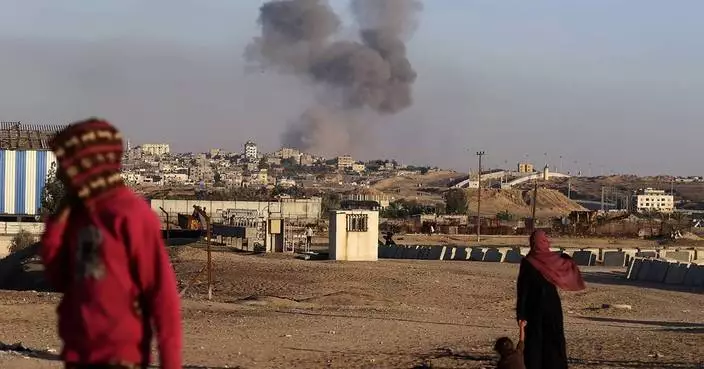DENVER (AP) — A former Colorado sheriff’s deputy was convicted of a misdemeanor on Friday in the shooting death of a 22-year-old man in distress who had called 911 for help after his car got stuck in a small mountain community.
Andrew Buen was also charged with second-degree murder and official misconduct in the 2022 death of Christian Glass, which drew national attention and prompted calls for police reform focused on crisis intervention. But jurors could not reach a verdict on those charges and only found him guilty of reckless endangerment, which is typically punished by a maximum four months in jail, The Denver Post reported.
A second-degree murder conviction would have carried a sentence of years in prison.
Prosecutors alleged that Buen needlessly escalated a standoff with Glass, who exhibited signs of a mental health crisis. But the defense said Buen shot Glass to protect a fellow officer, which made the shooting legally justified.
A second officer indicted in Glass’ death previously pleaded guilty to a misdemeanor. Six other officers have been charged with failing to intervene.
District Attorney Heidi McCollum still has the option of pursuing the charges against Buen for murder and official misconduct. She said Friday she expects to make a decision in the next couple of weeks.
An attorney for the Glass family said the family would like the prosecution continue.
"The jury found Deputy Buen’s conduct to be criminal,” Siddharta Rathod said. “The jury found Deputy Buen guilty of reckless endangerment. And it is one step closer to getting justice for Christian. Deputy Buen will reface a jury of his peers.”
Glass called for help after his SUV became stuck on a dirt road in Silver Plume. He told a dispatcher he was being followed and made other statements suggesting he was paranoid, hallucinating or delusional, and experiencing a mental health crisis, according to Buen's indictment.
When Buen and other officers arrived, Glass refused to get out of his vehicle. Officers’ body camera footage showed Glass making heart shapes with his hands to the officers and praying: “Dear Lord, please, don’t let them break the window.”
In closing arguments on Wednesday, prosecutors said Buen decided from the start that Glass needed to get out of the vehicle and shouted commands at him 46 times over about 10 minutes. The prosecution contends Buen did not have any legal justification to force Glass out, not even if it was a suspected case of driving under the influence.
They fired bean bag rounds and shocked him with a Taser, but those attempts failed to make Glass exit. He then took a knife he had offered to surrender at the beginning of the encounter and flung it out a rear window, which was broken by a bean bag, toward another officer, Randy Williams, according to the indictment. At that point, Buen fired five times at Glass.
Glass just reacted after being treated “like an animal in a cage being poked and prodded,” and the knife never touched Williams, District Attorney Heidi McCollum told jurors in closing arguments in Idaho Springs.
Defense lawyer Carrie Slinkard faulted prosecutors for not looking into whether Glass had behavioral or psychological issues that could explain his behavior, whether drugs had played a role, or whether both factors could have contributed.
Glass’ mother, Sally Glass, has previously said her son has depression and had recently been diagnosed with attention-deficit/hyperactivity disorder. She said he was “having a mental health episode” during his interaction with the police.
Chief Deputy District Attorney Stephen Potts, who described Glass as a “terrified boy,” said it did not matter what prompted the crisis.
“He was in a crisis of some kind," he said. "Is this how we expect people in crisis to be treated?”
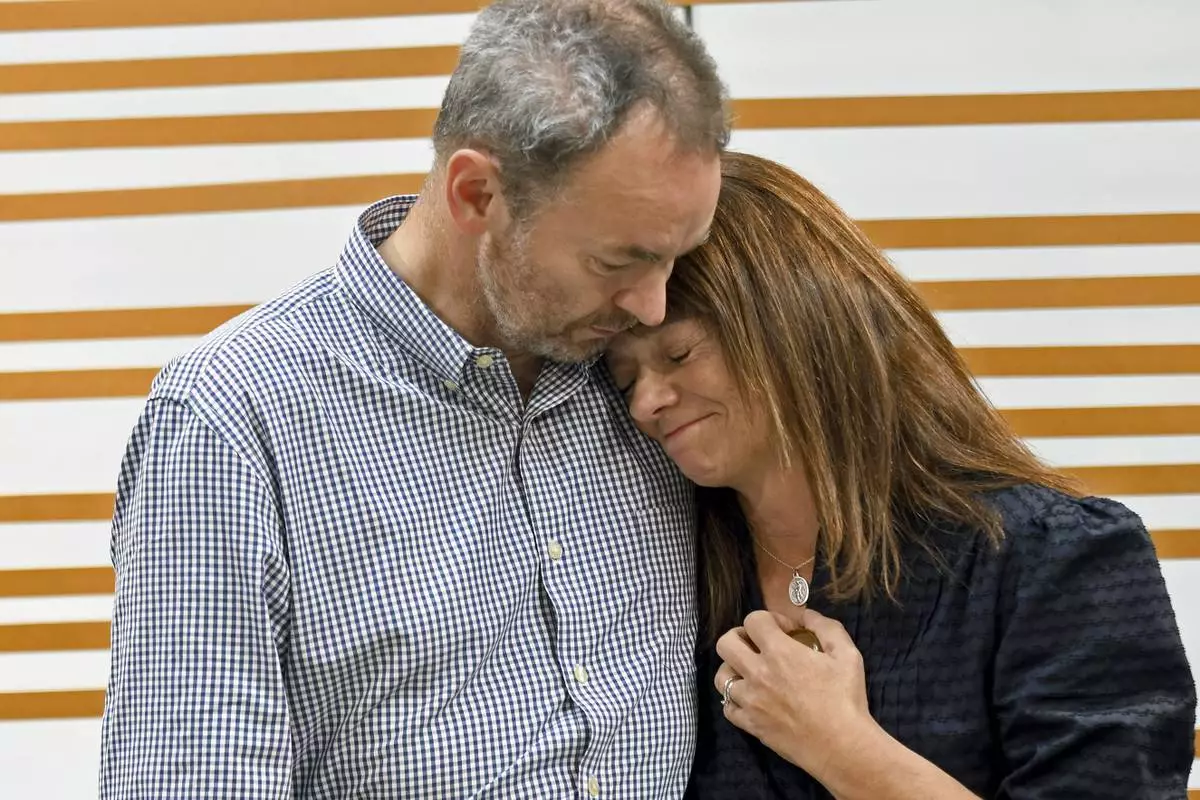
FILE - Simon and Sally Glass comfort each other during an emotional news conference about the death of their son, Christian Glass, Sept. 13, 2022, in Denver. A former Colorado sheriff’s deputy was convicted of a misdemeanor on Friday, April 26, 2024, in the shooting death of the 22-year-old man in distress who had called 911 for help after his car got stuck in a small mountain community. (AP Photo/Thomas Peipert, File)
WASHINGTON (AP) — The U.S. paused a shipment of bombs to Israel last week over concerns that the country was approaching a decision on launching a full-scale assault on the southern Gaza city of Rafah against the wishes of the U.S., Defense Secretary Lloyd Austin said Wednesday.
The shipment was supposed to consist of 1,800 2,000-pound (900-kilogram) bombs and 1,700 500-pound (225-kilogram) bombs, according to the official who spoke on the condition of anonymity. The focus of U.S. concern was the larger explosives and how they could be used in a dense urban setting like Rafa where more than 1 million civilians are sheltering after evacuating other parts of Gaza amid Israel’s war on Hamas, which came after the militant group’s deadly attack on Israel on Oct. 7.
Austin confirmed the weapons delay, telling the Senate Appropriations Defense subcommittee that the U.S. paused “one shipment of high payload munitions.”
“We’re going to continue to do what’s necessary to ensure that Israel has the means to defend itself,” Austin said. “But that said, we are currently reviewing some near-term security assistance shipments in the context of unfolding events in Rafah.”
The U.S. has historically provided enormous amounts of military aid to Israel. That has only accelerated in the aftermath of Hamas’ Oct. 7 attack that killed some 1,200 in Israel and led to about 250 being taken captive by militants. The pausing of the aid shipment is the most striking manifestation of the growing daylight between Israel Prime Minister Benjamin Netanyahu’s government and the administration of President Joe Biden, which has called on Israel to do far more to protect the lives of innocent civilians in Gaza.
It also comes as the Biden administration is due to deliver a first-of-its-kind formal verdict this week on whether the airstrikes on Gaza and restrictions on delivery of aid have violated international and U.S. laws designed to spare civilians from the worst horrors of war. A decision against Israel would further add to pressure on Biden to curb the flow of weapons and money to Israel’s military.
Biden signed off on the pause in an order conveyed last week to the Pentagon, according to U.S. officials who were not authorized to comment on the matter. The White House National Security Council sought to keep the decision out of the public eye for several days until it had a better understanding of the scope of Israel’s intensified military operations in Rafah and until Biden could deliver a long-planned speech on Tuesday to mark Holocaust Remembrance Day.
Biden’s administration in April began reviewing future transfers of military assistance as Netanyahu’s government appeared to move closer toward an invasion of Rafah, despite months of opposition from the White House. The official said the decision to pause the shipment was made last week and no final decision had been made yet on whether to proceed with the shipment at a later date.
U.S. officials had declined for days to comment on the halted transfer, word of which came as Biden on Tuesday described U.S. support for Israel as “ironclad, even when we disagree.”
Press secretary Karine Jean-Pierre declined to square the arms holdup with Biden’s rhetoric in support of Israel, saying only, “Two things could be true.”
Austin told lawmakers Wednesday, “It’s about having the right kinds of weapons for the task at hand.”
"A small diameter bomb, which is a precision weapon, that’s very useful in a dense, built-up environment,” he said, “but maybe not so much a 2,000-pound bomb that could create a lot of collateral damage.” He said the U.S. wants to see Israel do “more precise” operations.
Israeli troops on Tuesday seized control of Gaza’s vital Rafah border crossing in what the White House described as a limited operation that stopped short of the full-on Israeli invasion of the city that Biden has repeatedly warned against on humanitarian grounds, most recently in a Monday call with Netanyahu.
Israel has ordered the evacuation of 100,000 Palestinians from the city. Israeli forces have also carried out what it describes as “targeted strikes” on the eastern part of Rafah and captured the Rafah crossing, a critical conduit for the flow of humanitarian aid along the Gaza-Egypt border.
Privately, concern has mounted inside the White House about what’s unfolding in Rafah, but publicly administration officials have stressed that they did not think the operations had defied Biden’s warnings against a widescale operation in the city.
White House National Security Council spokesman John Kirby said Israel described the operation along the Gaza-Egypt border in eastern Rafah as “an operation of limited scale and duration” aimed at cutting off Hamas arms smuggling, but also said the U.S. would monitor the fighting.
Just last month, Congress passed a $95 billion national security bill that included funding for Ukraine, Israel and other allies. The package included more than $14 billion in military aid for Israel, though the stalled transfer was not related to that measure.
The State Department is separately considering whether to approve the continued transfer of Joint Direct Attack Munition kits, which place precision guidance systems onto bombs, to Israel, but the review didn’t pertain to imminent shipments.
The U.S. dropped the 2,000-pound bomb sparingly in its long war against the Islamic State militant group. Israel, by contrast, has used the bomb frequently in the seven-month Gaza war. Experts say the use of the weapon, in part, has helped drive the enormous Palestinian casualty count that the Hamas-run health ministry puts at more than 34,000 dead, though it doesn’t distinguish between militants and civilians.
The U.S.-Israel relationship has been close through both Democratic and Republican administrations. But there have been other moments of deep tension since Israel's founding in which U.S. leaders have threatened to hold up aid in attempt to sway Israeli leadership.
President Dwight Eisenhower pressured Israel with the threat of sanctions into withdrawing from the Sinai in 1957 in the midst of the Suez Crisis. Ronald Reagan delayed the delivery of F16 fighter jets to Israel at a time of escalating violence in the Middle East. President George H.W. Bush held up $10 billion in loan guarantees to force the cessation of Israeli settlement activity in the occupied territories.
—
AP writers Lolita C. Baldor and Matthew Lee contributed to this report.

White House press secretary Karine Jean-Pierre speaks during a briefing at the White House, Tuesday, May 7, 2024, in Washington. (AP Photo/Evan Vucci)

President Joe Biden speaks at the U.S. Holocaust Memorial Museum's Annual Days of Remembrance ceremony at the U.S. Capitol, Tuesday, May 7, 2024 in Washington. (AP Photo/Evan Vucci)
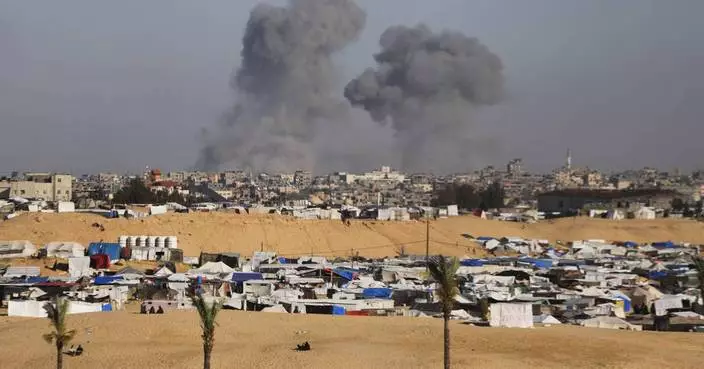
Pentagon chief confirms US has paused bomb shipment to Israel to signal concerns over Rafah invasion

Pentagon chief confirms US has paused bomb shipment to Israel to signal concerns over Rafah invasion
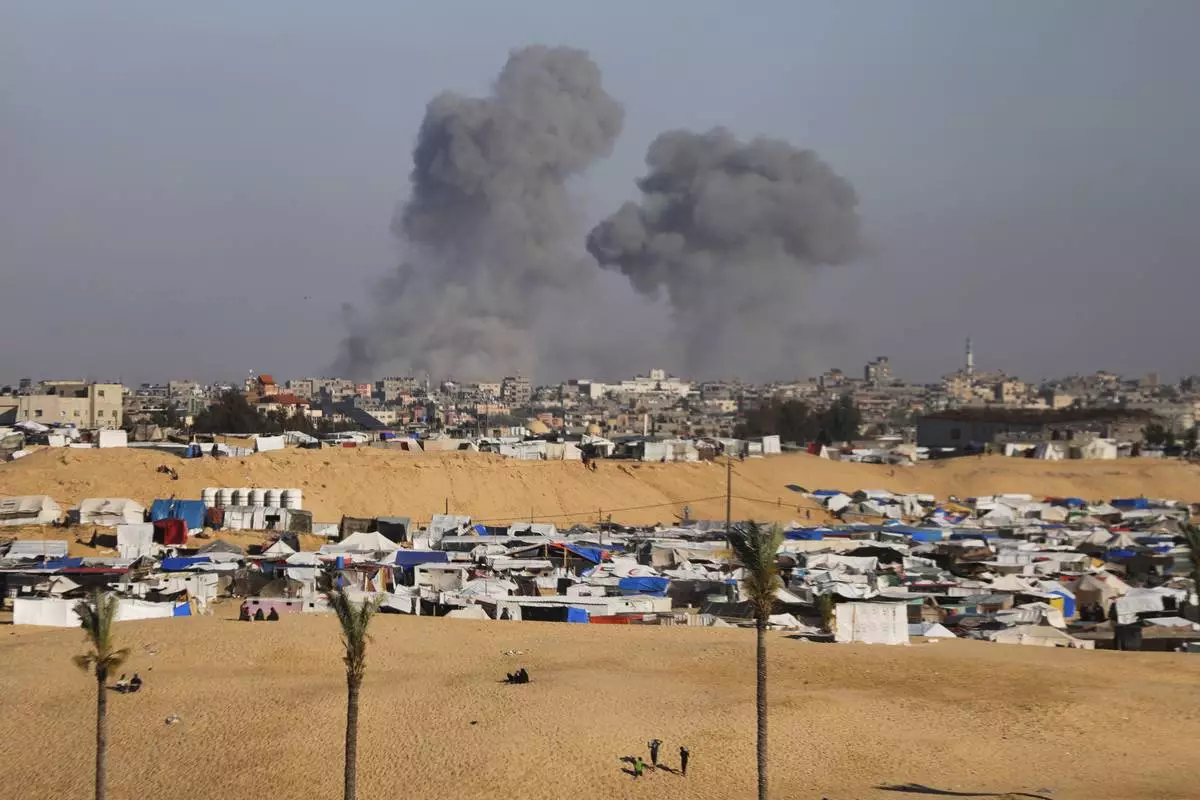
Smoke rises following an Israeli airstrike east of Rafah, Gaza Strip, Monday, May 6, 2024. (AP Photo/Ismael Abu Dayyah)









